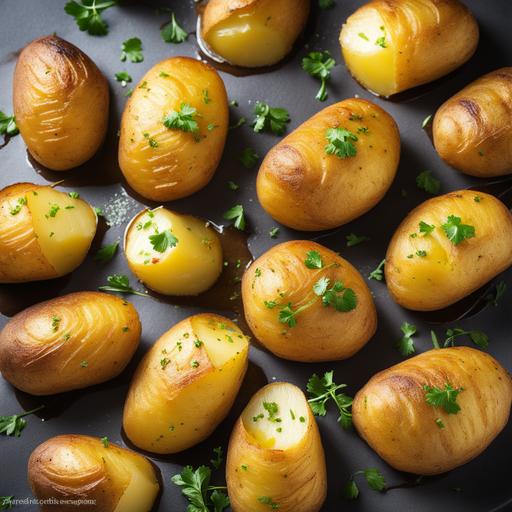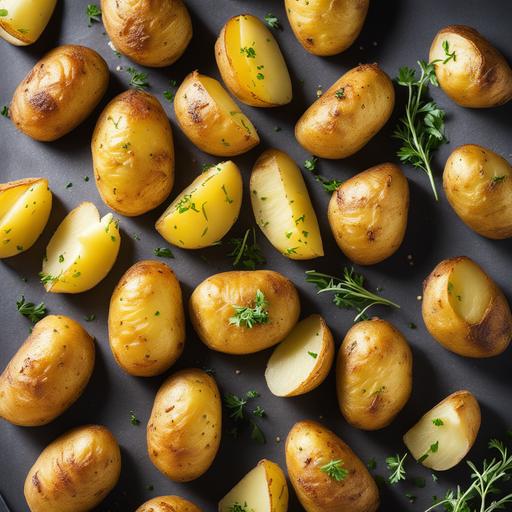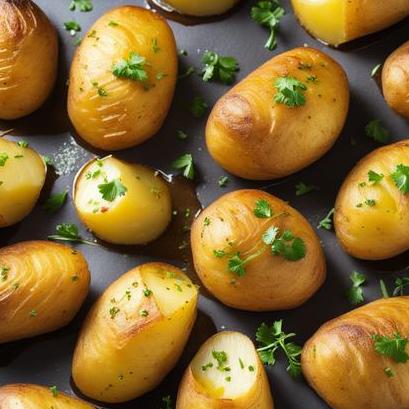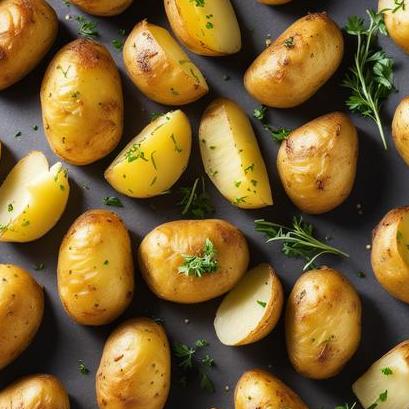
The Golden Potatoes Oven Recipe: A Guide To Heavenly Flavor
Potatoes have long been a staple in kitchens worldwide, and for good reason. Versatile, budget-friendly, and undeniably delicious, they can be prepared in countless ways to suit any palate. Among the myriad potato recipes out there, perhaps none are as remarkable as the golden potatoes oven recipe.
In this comprehensive article, we will delve into the intriguing world of golden potatoes. We will explore the food science behind their delectable qualities, discuss culinary details that make this recipe truly remarkable, guide you through the selection and cleaning process, provide expert tips, highlight variations to suit different tastes, and teach you how to achieve the perfect doneness. So, let’s roll up our sleeves and embark on this culinary adventure.
The Food Science of Golden Potatoes
At the very core of the golden potatoes oven recipe lies the science of starch and heat. Potatoes contain both amylose and amylopectin, two types of starch molecules. When potatoes are cooked, these starch molecules undergo structural changes known as gelatinization.
During gelatinization, the amylose and amylopectin molecules absorb water and swell, transforming into a gel-like substance. This process contributes to the creamy texture and delightful golden crust that characterizes golden potatoes baked in the oven.
Culinary Details That Set Golden Potatoes Apart
The golden potatoes oven recipe is unique in its ability to strike the perfect balance between a crispy exterior and a soft, buttery interior. This delightful contrast of textures is achieved through meticulous culinary details.
First and foremost, the type of potato used is crucial. Russet potatoes, with their high starch content, make for the best choice. Their fluffy texture and mild flavor create an ideal canvas for the golden crust to develop.
Next, the potatoes should be cut into uniform slices or wedges, ensuring even cooking. The thickness of the slices can influence the overall result. Thin slices tend to yield a crispier texture, while thicker slices offer a tender bite.
Selection and Cleaning

Selecting the Perfect Potatoes
When embarking on your golden potato adventure, selecting the right potatoes is fundamental. Look for potatoes that are firm, blemish-free, and not overly sprouted. Opt for medium to large-sized potatoes, as they are easier to work with when slicing.
Thoroughly Cleaning Potatoes
Before preparing your precious potatoes, it’s essential to clean them thoroughly to remove any dirt or residue. Start by gently scrubbing the potatoes under cool running water using a produce brush. Ensure that all traces of soil are removed, paying special attention to crevices and eyes.
Preparation Tips

Preparing the potatoes for their journey into the oven involves a few essential steps to ensure optimal results. Let’s dive into these key techniques:
Parboiling for Textural Perfection
Parboiling, or partially boiling the potatoes before transferring them to the oven, is a crucial step to achieve the ideal golden crust. Begin by placing the sliced potatoes in a pot of cold, salted water. Bring the water to a boil and let the potatoes cook for about 5 minutes. This process will partially cook the potatoes, enabling them to develop a crispy exterior while maintaining a creamy interior.
The Boiling Salt Solution
Adding salt to the water during parboiling serves two purposes:enhancing the potatoes’ natural flavor and helping to extract excess moisture from the surface. A good guideline is to use approximately 1 tablespoon of salt for every quart of water.
The Power of Patting Dry
After parboiling, it is crucial to drain the potatoes thoroughly and pat them dry. Excess moisture can hinder the browning process and compromise the texture. Use a clean kitchen towel or paper towels to gently blot away any remaining water.
Variations to Suit Every Palate

While the classic golden potatoes recipe is a delight in itself, you can unleash your culinary creativity and add your own unique twists. Here are some variations to inspire your taste buds:
Herbed Infusion
Infusing the parboiling water with fresh herbs adds a delightful aromatic touch to the potatoes. Experiment with rosemary, thyme, or oregano to elevate their flavor profile.
Zesty Citrus Zing
For those looking to brighten their golden potatoes, consider adding a burst of citrusy goodness. Simply incorporate freshly grated lemon or orange zest into the seasoning. The subtle tang adds a refreshing twist to the dish.
Cheesy Dream
If you’re a cheese lover, why not sprinkle a generous amount of your favorite grated cheese onto the potatoes before baking? As the cheese melts and caramelizes, it creates a heavenly crust that will leave you craving more.
Achieving Doneness: The Golden Objective

Determining the precise moment when your golden potatoes are perfectly cooked can be a matter of individual preference. Some prefer them slightly undercooked for a denser texture, while others enjoy a softer interior. Achieving the desired doneness can be done through careful observation or using simple tests.
Observing the Golden Hue
As the potatoes bake, their exterior will gradually transform into a beautiful golden color. Pay attention to this transformation, as a deep golden hue usually indicates that the potatoes have reached optimum doneness.
The Fork Test
If visual cues are not enough, you can confirm doneness by performing the trusty fork test. Insert a fork or a sharp knife into the thickest part of a potato slice. If it effortlessly slides in and out while leaving a tender interior, your golden potatoes are ready to be enjoyed.
Conclusion
The golden potatoes oven recipe showcases the magical culinary alchemy resulting from the harmonious union of heat, starch, and meticulous technique. From the selection and cleaning process to the parboiling techniques, seasoning options, and achieving the perfect doneness, we have explored the multifaceted world of golden potatoes.
So, next time you find yourself longing for a comforting and indulgent potato dish, remember the golden potatoes oven recipe. With its crisp exterior, buttery interior, and endless variations, it is bound to bring joy to your palate and create lasting memories around the dinner table.
Sources
FAQS On Golden Potatoes Oven Recipe
What Ingredients Do I Need For A Golden Potatoes Oven Recipe?
To make golden potatoes in the oven, you will need 1 ½ pounds of Yukon gold potatoes, 2 tablespoons of olive oil, 1 teaspoon of garlic powder, 1 teaspoon of onion powder, 1 teaspoon of dried rosemary, salt and pepper to taste.
How Do I Prepare The Potatoes Before Cooking Them In The Oven?
To prepare the potatoes before cooking, start by preheating your oven to 425°F (220°C). Wash the potatoes thoroughly and pat them dry with a clean towel. Cut the potatoes into bite-sized chunks, preferably uniform in size, to ensure even cooking.
What Is The Recommended Method Of Seasoning For Golden Potatoes In The Oven?
For a delicious flavor, combine the olive oil, garlic powder, onion powder, dried rosemary, salt, and pepper in a small bowl. Drizzle the seasoning mixture over the potatoes and toss them gently to ensure they are evenly coated.
How Long Should I Bake The Golden Potatoes In The Oven?
Place the seasoned potatoes on a baking sheet in a single layer and bake them in the preheated oven for approximately 25-30 minutes. Keep an eye on them, as cooking times may vary depending on the size of the potato chunks and your desired level of crispiness.
Can I Customize This Recipe By Adding More Ingredients Or Changing The Seasoning?
Absolutely! This recipe provides a basic seasoning combination, but you can always experiment with your favorite herbs and spices to suit your taste preferences. Consider adding fresh herbs like thyme or parsley, or even sprinkle some grated Parmesan cheese on top for an extra savory touch.


